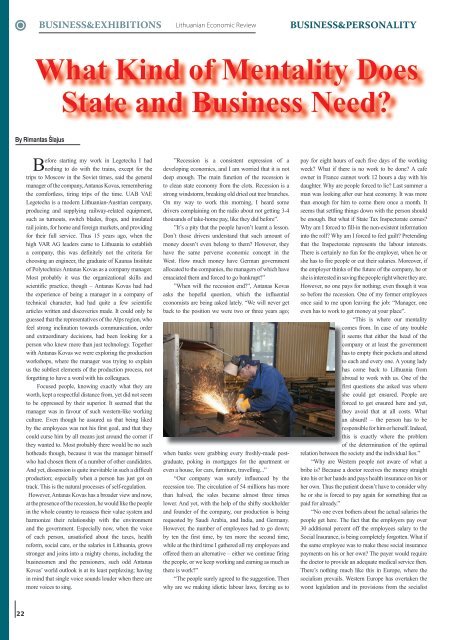Jie neleidžia nutilti gerai muzikai - Business and Exhibitions
Jie neleidžia nutilti gerai muzikai - Business and Exhibitions
Jie neleidžia nutilti gerai muzikai - Business and Exhibitions
You also want an ePaper? Increase the reach of your titles
YUMPU automatically turns print PDFs into web optimized ePapers that Google loves.
BUSINESS&EXHIBITIONS Lithuanian Economic Review BUSINESS&PERSONALITY<br />
What Kind of Mentality Does<br />
State <strong>and</strong> <strong>Business</strong> Need?<br />
By Rimantas Šlajus<br />
22<br />
Before starting my work in Legetecha I had<br />
nothing to do with the trains, except for the<br />
trips to Moscow in the Soviet times, said the general<br />
manager of the company, Antanas Kovas, remembering<br />
the comfortless, tiring trips of the time. UAB VAE<br />
Legetecha is a modern Lithuanian-Austrian company,<br />
producing <strong>and</strong> supplying railway-related equipment,<br />
such as turnouts, switch blades, frogs, <strong>and</strong> insulated<br />
rail joints, for home <strong>and</strong> foreign markets, <strong>and</strong> providing<br />
for their full service. Thus 15 years ago, when the<br />
high VAR AG leaders came to Lithuania to establish<br />
a company, this was definitely not the criteria for<br />
choosing an engineer, the graduate of Kaunas Institute<br />
of Polytechnics Antanas Kovas as a company manager.<br />
Most probably it was the organizational skills <strong>and</strong><br />
scientific practice, though – Antanas Kovas had had<br />
the experience of being a manager in a company of<br />
technical character, had had quite a few scientific<br />
articles written <strong>and</strong> discoveries made. It could only be<br />
guessed that the representatives of the Alps region, who<br />
feel strong inclination towards communication, order<br />
<strong>and</strong> extraordinary decisions, had been looking for a<br />
person who knew more than just technology. Together<br />
with Antanas Kovas we were exploring the production<br />
workshops, where the manager was trying to explain<br />
us the subtlest elements of the production process, not<br />
forgetting to have a word with his colleagues.<br />
Focused people, knowing exactly what they are<br />
worth, kept a respectful distance from, yet did not seem<br />
to be oppressed by their superior. It seemed that the<br />
manager was in favour of such western-like working<br />
culture. Even though he assured us that being liked<br />
by the employees was not his first goal, <strong>and</strong> that they<br />
could curse him by all means just around the corner if<br />
they wanted to. Most probably there would be no such<br />
hotheads though, because it was the manager himself<br />
who had chosen them of a number of other c<strong>and</strong>idates.<br />
And yet, dissension is quite inevitable in such a difficult<br />
production; especially when a person has just got on<br />
track. This is the natural processes of self-regulation.<br />
However, Antanas Kovas has a broader view <strong>and</strong> now,<br />
at the presence of the recession, he would like the people<br />
in the whole country to reassess their value system <strong>and</strong><br />
harmonize their relationship with the environment<br />
<strong>and</strong> the government. Especially now, when the voice<br />
of each person, unsatisfied about the taxes, health<br />
reform, social care, or the salaries in Lithuania, grows<br />
stronger <strong>and</strong> joins into a mighty chorus, including the<br />
businessmen <strong>and</strong> the pensioners, such odd Antanas<br />
Kovas’ world outlook is at its least perplexing; having<br />
in mind that single voice sounds louder when there are<br />
more voices to sing.<br />
”Recession is a consistent expression of a<br />
developing economics, <strong>and</strong> I am worried that it is not<br />
deep enough. The main function of the recession is<br />
to clean state economy from the clots. Recession is a<br />
strong windstorm, breaking old dried out tree branches.<br />
On my way to work this morning, I heard some<br />
drivers complaining on the radio about not getting 3-4<br />
thous<strong>and</strong>s of take-home pay, like they did before”.<br />
”It’s a pity that the people haven’t learnt a lesson.<br />
Don’t those drivers underst<strong>and</strong> that such amount of<br />
money doesn’t even belong to them? However, they<br />
have the same perverse economic concept in the<br />
West. How much money have German government<br />
allocated to the companies, the managers of which have<br />
emaciated them <strong>and</strong> forced to go bankrupt?”<br />
”When will the recession end?”, Antanas Kovas<br />
asks the hopeful question, which the influential<br />
economists are being asked lately. “We will never get<br />
back to the position we were two or three years ago;<br />
when banks were grabbing every freshly-made postgraduate,<br />
poking in mortgages for the apartment or<br />
even a house, for cars, furniture, travelling...”<br />
“Our company was surely influenced by the<br />
recession too. The circulation of 54 millions has more<br />
than halved, the sales became almost three times<br />
lower. And yet, with the help of the shifty stockholder<br />
<strong>and</strong> founder of the company, our production is being<br />
requested by Saudi Arabia, <strong>and</strong> India, <strong>and</strong> Germany.<br />
However, the number of employees had to go down;<br />
by ten the first time, by ten more the second time,<br />
while at the third time I gathered all my employees <strong>and</strong><br />
offered them an alternative – either we continue firing<br />
the people, or we keep working <strong>and</strong> earning as much as<br />
there is work?”<br />
“The people surely agreed to the suggestion. Then<br />
why are we making idiotic labour laws, forcing us to<br />
pay for eight hours of each five days of the working<br />
week? What if there is no work to be done? A cafe<br />
owner in France cannot work 12 hours a day with his<br />
daughter. Why are people forced to lie? Last summer a<br />
man was looking after our heat economy. It was more<br />
than enough for him to come there once a month. It<br />
seems that settling things down with the person should<br />
be enough. But what if State Tax Inspectorate comes?<br />
Why am I forced to fill-in the non-existent information<br />
into the roll? Why am I forced to feel guilt? Pretending<br />
that the Inspectorate represents the labour interests.<br />
There is certainly no fun for the employer, when he or<br />
she has to fire people or cut their salaries. Moreover, if<br />
the employer thinks of the future of the company, he or<br />
she is interested in saving the people right where they are.<br />
However, no one pays for nothing; even though it was<br />
so before the recession. One of my former employees<br />
once said to me upon leaving the job: “Manager, one<br />
even has to work to get money at your place”.<br />
“This is where our mentality<br />
comes from. In case of any trouble<br />
it seems that either the head of the<br />
company or at least the government<br />
has to empty their pockets <strong>and</strong> attend<br />
to each <strong>and</strong> every one. A young lady<br />
has come back to Lithuania from<br />
abroad to work with us. One of the<br />
first questions she asked was where<br />
she could get ensured. People are<br />
forced to get ensured here <strong>and</strong> yet,<br />
they avoid that at all costs. What<br />
an absurd! – the person has to be<br />
responsible for him or herself. Indeed,<br />
this is exactly where the problem<br />
of the determination of the optimal<br />
relation between the society <strong>and</strong> the individual lies.”<br />
“Why are Western people not aware of what a<br />
bribe is? Because a doctor receives the money straight<br />
into his or her h<strong>and</strong>s <strong>and</strong> pays health insurance on his or<br />
her own. Thus the patient doesn’t have to consider why<br />
he or she is forced to pay again for something that as<br />
paid for already.”<br />
“No one even bothers about the actual salaries the<br />
people get here. The fact that the employers pay over<br />
30 additional percent off the employees salary to the<br />
Social Insurance, is being completely forgotten. What if<br />
the same employee was to make these social insurance<br />
payments on his or her own? The payer would require<br />
the doctor to provide an adequate medical service then.<br />
There’s nothing much like this in Europe, where the<br />
socialism prevails. Western Europe has overtaken the<br />
worst legislation <strong>and</strong> its provisions from the socialist





